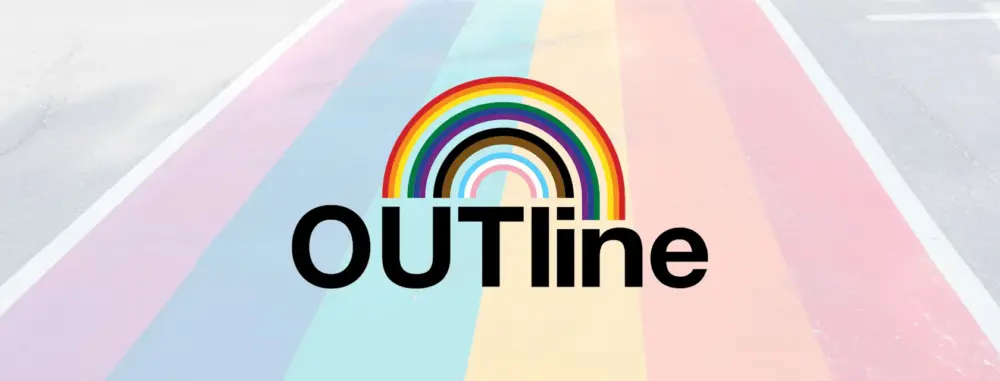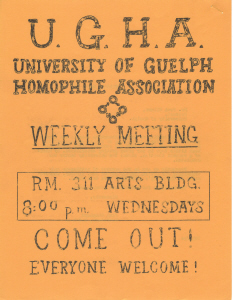In the 1970s, a proposal for the formation of OUTline stated:
“It is not easy being gay (or even heterosexual) in a society where there are so many unanswered questions regarding sexual behaviour. We try to encourage people to find strength and confidence in themselves to overcome the conspiracy of silence.”
As OUTline, University of Guelph’s support centre for LGBTQ2IA+ students, celebrates its 50th anniversary in the 2024-2025 academic year, these words still resonate decades later.
This Pride Month, OUTline reflects on how to continue its legacy, which spans generations, of providing strength and connection to LGBTQ2IA+ students.
“I think the key thing that I want to focus on in the coming years is to increase safety for queer students,” says Caleb Harwood, U of G’s sexual and gender diversity advisor and supervisor of OUTline. “I would really love to see OUTline grow. I want everyone to recognize that creating safety and community has to involve all students, staff and faculty.”

OUTline’s history from one-way telephone message to online chat

Beginning as a telephone-based resource for students, OUTline has been providing confidential support for students who wish to anonymously connect about sexuality and gender topics since the 1970s, when it grew out of a branch of Guelph Queer Equality.
In these formative years, their social events included regular dances, despite the “adverse attitudes” of the 1970s, as early OUTline documents put it. Political advocacy was also common, as OUTline members lobbied to improve provincial and federal legislation in the protection of gay rights.
Their phone line began as just a recorded message that directed users to resources, but advocacy within the University led it to be upgraded to a live service staffed by trained student volunteers.
Today, OUTline runs an online chat from 7 to 10 p.m. every day of the week. In the summer, when the chat is not active, students instead can connect with U of G’s sexual and gender diversity advisor directly.
Confidential support is still a core offering of OUTline, and students may choose to stay anonymous when accessing service. But its many student-led programs, which Harwood says are “entirely driven by student leaders’ desire and passion to see a more inclusive campus,” have grown into hubs for vibrant community building, education and social connection for U of G’s LGBTQ2IA+ students.
A place of essential community building – on and offline
“This past semester, we really tried to create different programs that started online but would lead people to come to an in-person event,” Harwood says, explaining that one successful community-building space has been their online Minecraft meet-ups. “For some students, an OUTline group was the first in-person event they came to in their university history.”

Other crucial groups have been aimed at discussing coming out and the associated social pressures, as well as safe places for trans and gender-diverse students.
New this year is a student-led group that explores non-Western queer histories and identities, studied from an anti-colonial lens. Here, participants actively unpack pre-colonial queer identities and attempt to undo Eurocentric ideas of sexuality.
In the coming years, a new student staff member will oversee this initiative and help locate intersections between queer, Black, First Nations, Inuit and Métis people and other racialized identities.
“I have been noticing a lot of excitement from students to really talk about these intersecting identities,” Harwood says. “We really want to make it so that everyone is comfortable to learn in every OUTline space.”
New discussion groups have also focused on the experience of neurodiversity, as Harwood explains that there are many parallels between the experiences of queer, trans and neurodivergent students.
“Right now, I’m focusing on questions like: How do we pull down barriers so that students can truly unmask in these spaces, and how do we provide that education?”
As LGBTQ2IA+ rights are being stripped across the world, Harwood has noticed a “theme of worry and fear” at this year’s meetings. Stories of violence against queer people have also changed the dynamic of OUTline’s meeting spaces recently.
But Harwood is optimistic that OUTline members will be resilient, growing past the fear and into their vision of true community care.
“In 50 years, I want all queer students to feel safe in centring their identities at the University,” Harwood says. “It can be a worrying time for so many people, but we can’t let that stop us from moving ahead and doing the work of community care we have set out to do.”
Contact:
Sexual and Gender Diversity Advisor
sgd@uoguelph.ca
